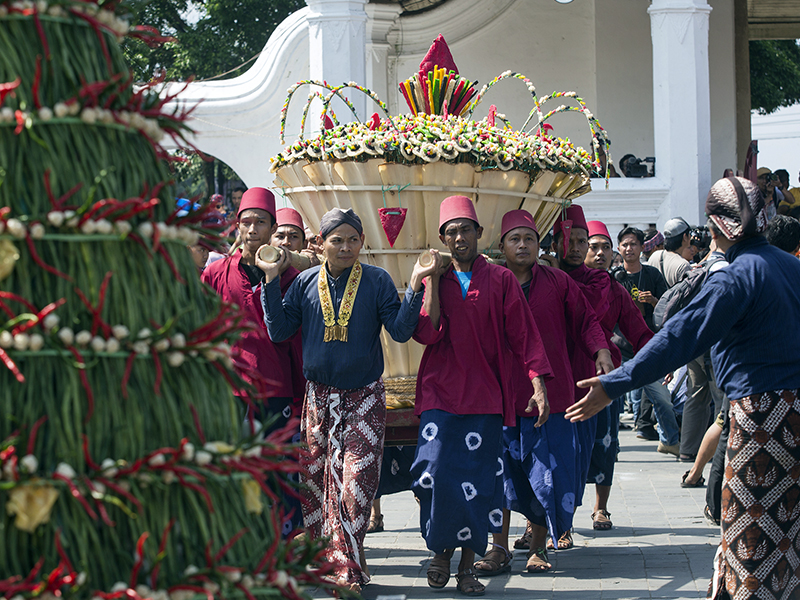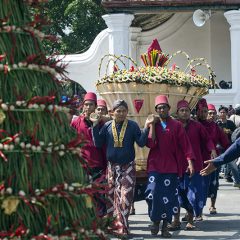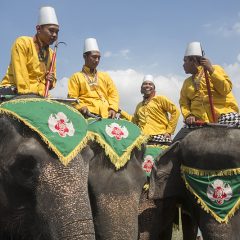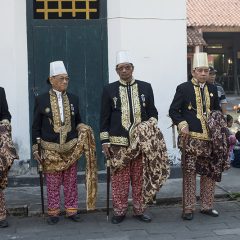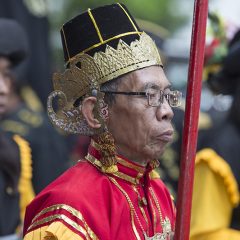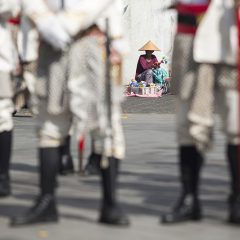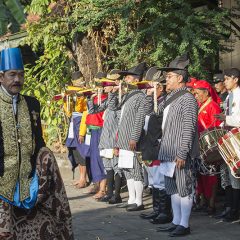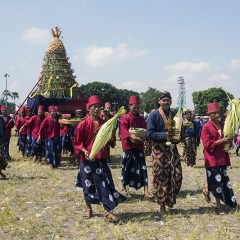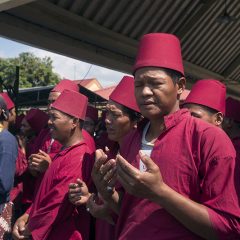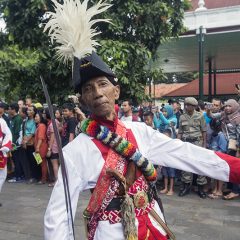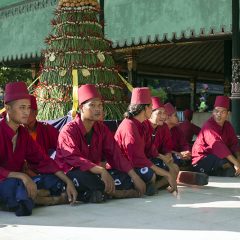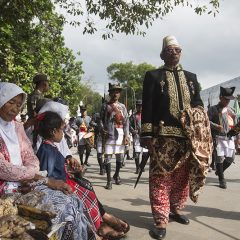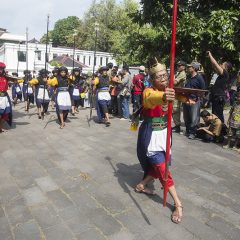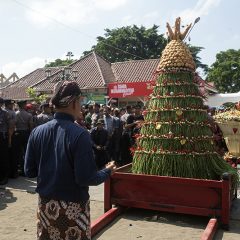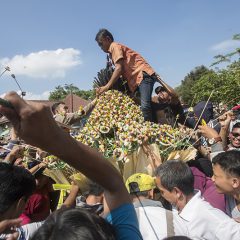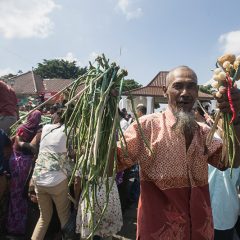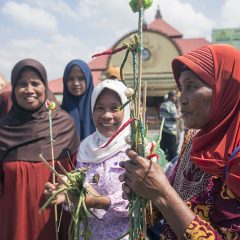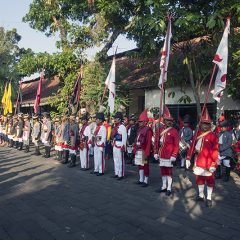- Two offering “gunungans” arrive at the Grand Kauman Mosque. They are made of long beans, chilies and rice cookies and shaped in forms believed to be symbolic — a pyramid for the male gunungan and a basket for the female gunungan. RNS photo by Alexandra Radu
- Handlers relax while riding the Yogyakarta palace elephants for the Grebeg Syawal procession on June 26, 2017. The elephants open the way for the offering processions along Yogyakarta streets. RNS photo by Alexandra Radu
- Commanders of the warrior troops line up for the beginning of the Grebeg Syawal procession on June 26, 2017. They are dressed in the traditional ceremonial attire of high officials, displaying the batik cloth, an Indonesian handmade fabric. This batik clothing is decorated with certain designs and colors that can only be worn by high-ranking palace officials. RNS photo by Alexandra Radu
- A palace warrior from the Nyutra battalion is dressed in the ceremonial attire specific to his battalion. The Nyutra battalion used to function as the sultan’s personal guards during public ceremonies. RNS photo by Alexandra Radu
- A street vendor watches the palace warriors parade during the Grebeg Syawal ceremony in Yogyakarta, Indonesia. RNS photo by Alexandra Radu
- Musicians play as GBPH (Gusti Bendara Pangeran Harya) Yudhaningrat, left, the younger brother of Sri Sultan Hamengkubuwono X and commander of the Yogyakarta palace troops, receives honors at the beginning of the Grebeg Syawal ceremony. RNS photo by Alexandra Radu
- Palace workers carry offerings from the Yogyakarta palace to the Grand Kauman Mosque, during the Grebeg Syawal ceremony on June 26, 2017, in Yogyakarta, Indonesia. From the five offering “gunungans” present in the ceremony, two were taken to the Grand Kauman Mosque, two to a Hindu temple and one to the governor’s office. RNS photo by Alexandra Radu
- Palace workers and people participating in the Grebeg Syawal parade pray before beginning to dismantle the offering “gunungan.” RNS photo by Alexandra Radu
- Warriors of the Jagakarya battalion march out of the palace grounds during the Grebeg Syawal procession. The soldiers of this particular battalion were traditionally responsible for securing the implementation of the government’s projects in the Yogyakarta territory. RNS photo by Alexandra Radu
- The commander of a Dhaeng warriors platoon walks with “lion steps” in front of his troops during the Grebeg Syawal ceremony. The Dhaeng warriors were elite fighters brought from Makassar, South Sulawesi, by the Dutch government during the colonial era. RNS photo by Alexandra Radu
- Palace workers sit in their designated spots next to the offering “gunungan” they are responsible for carrying during the Grebeg Syawal procession. The function as palace workers is passed down from generation to generation. RNS photo by Alexandra Radu
- The commander of a palace warriors battalion parades along with his troops during the Grebeg Syawal ceremony. RNS photo by Alexandra Radu
- The commander of a Nyutra warriors platoon walks with dance steps in front of his troops during the Grebeg Syawal procession. The steps used by the parading troops inside the palace grounds greatly differ from the steps used outside the palace grounds. Walking inside the palace grounds is done in a slow and wavy manner, using a step unique to the Yogyakarta palace, named “langkah macan“ (lion steps). RNS photo by Alexandra Radu
- Before the dismantling of the offering “gunungans” begins, prayers are held in the courtyard of the Grand Kauman Mosque in Yogyakarta, Indonesia. RNS photo by Alexandra Radu
- In a matter of minutes, offerings are dismantled as locals frantically compete to get a piece of the sultan’s gifts, which are believed to bring luck to the receivers. RNS photo by Alexandra Radu
- A man shows his share of the gifts. The fresh vegetables will be consumed, while the dry rice cookies will be preserved as symbols of the connection between the sultan and the people of Yogyakarta. RNS photo by Alexandra Radu
- Women hold pieces of the offerings they have taken during the dismantling of the offering “gunungans.” RNS photo by Alexandra Radu
- Flag-bearers of the 11 battalions of Yogyakarta’s palace warriors align with the flags representing their battalion in a salute ceremony before the beginning of the Grebeg Syawal procession inside the grounds of the palace on June 26, 2017, in Yogyakarta, Indonesia. Warriors from each battalion are dressed in their distinctive attire, as each battalion was historically responsible for different tasks in Yogyakarta’s sultanate territory. RNS photo by Alexandra Radu
YOGYAKARTA, Indonesia (RNS) Indonesia is the world’s most populous Muslim country, and Eid al-Fitr customs, celebrating the end of the Ramadan month of fasting, vary across the archipelago.
In Yogyakarta, a city on the island of Java, a sultan, or monarch, Hamengkubuwono X, plays an important role to this day.
The sultan is regarded as the representative of God and acts as the leader and protector of Islam in the region.
[ad number=“1”]
On the second day of Eid al-Fitr, the Grebeg Syawal ceremony takes place, in which alms from the sultan are given to his people.
The alms called, “gunungans,” are piles of food that resemble mountains made of vegetables (long beans, chilies) and rice cookies, which are thought to bring luck. After an elaborate procession through various venues, the gunungans are dismantled by the local people, who frenetically compete to get some of the sultan’s gifts.
[ad number=“2”]
